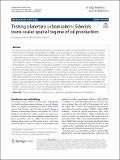Testing planetary urbanisation: Siberia’s trans-scalar spatial regime of oil production
Author(s)
Salgueiro Barrio, Roi; O’Shea, Conor
Download40410_2022_Article_168.pdf (3.828Mb)
Publisher with Creative Commons License
Publisher with Creative Commons License
Creative Commons Attribution
Terms of use
Metadata
Show full item recordAbstract
Abstract
This paper analyses the extended urbanization of oil production in Siberia in order to test Neil Brenner and Christian Schmid’s theory of planetary urbanization. According to these authors, the intensification of the urban process triggered by the consolidation of global neoliberalism since the early 1990s, has transformed the planet into a situation of total urbanization. In their view, this planetary condition can be measured by the incorporation of former remote wilderness such as the Amazon, the oceans, the deserts or Siberia within urban circuits of production (which they label under the notion of extended urbanization). In this article we test if Brenner and Schmid’s hypothesis applies to the Siberian case. With that goal, we develop a diachronic historic and cartographic analysis which shows first the incorporation of Siberia to the Russian Empire, second the consolidation of East Asia-Russia commercial circuits, and third the conceptualization of Siberia as primarily an area for resource extraction. Such analysis leads us to define three historic spatial regimes for the whole Siberia, the last of which we study in relation to the notion of planetary urbanization. Our study compares the geographies of oil production in the region first during the Soviet period, and then, following Brenner and Schmid’s chronology, after the 1990s. The article concludes that the latter phase certainly implies an unprecedented intensification of extended urbanization and the incorporation of Siberia into trans-scalar global circuits of production. Finally, in order to analyse the relation between this process and the consolidation of neoliberalism we develop a synchronic study and mapping of the operations of two oil companies: a public one, NOC ROSNEFT, and a private one, LUKOIL. We conclude that both are similarly invested in creating the trans-scalar geographies of uneven development that characterize neoliberalism.
Date issued
2022-07-04Department
Massachusetts Institute of Technology. School of Architecture and PlanningPublisher
Springer Berlin Heidelberg
Citation
City, Territory and Architecture. 2022 Jul 04;9(1):23
Version: Final published version